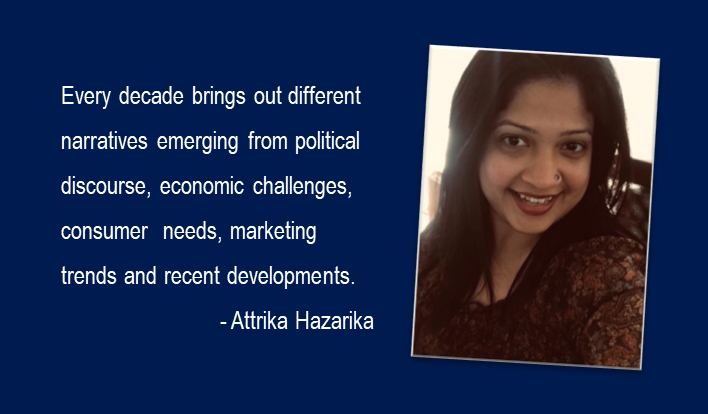Narrative as defined in the Oxford dictionary somewhat reads as: A telling of some true or fictitious event or connected sequence of events, recounted by a narrator to a narratee. A narrative when expressed in an authentic manner coupled with facts, data and illustrative examples can be a strong influence to shape opinions, make informed decisions, re-think our thought processes and also unlearn from our errors. A small expression by verbally sharing or documentation can be a starting point for discussion and reflection for the family, building culture at a professional space or impact changes at the global level.
We are living at a post pandemic era wherein it is all the the more pertinent to filter misinformation into facts because if unchecked, it can spiral into panic, chaos, blame – games and disillusionment perhaps. Through this write up, I will attempt to share the power of narratives at three different levels: Personal, Professional and Global.
Personal – Personal space is the inner most level, considered to be the most sacred entity wherein it comprises of family, friends and closed network. Here, narratives of childhood stories, anecdotes of generations, family accomplishments and struggles are passed down. Narratives are mostly shared from grandparents to grandchildren with topics of heroic battles and endings with happiness, morality and hope. The narrative shared here is usually unfiltered (spoken as is), riddled with an emotional tone and this is how a child conditions to narrate to the outside world. Biographies and iconic movies capture these narratives and has always been a point of reference to learn, be motivated and adapt it to our own lives.
Professional – A career narrative comes from the way that one processes every experience related to career. Something happens in one’s career, and then one decides whether it was a good or bad experience, a meaning is attached. And that creates these series of events that, when pulled together, create a narrative. Everyone is entitled to a unique career narrative based on their experience but often we are encouraged here to replace our narratives, due to fear of being assessed by the authorities, of being ‘emotional’ or ‘rebellious’ to ‘professionalism’ that covers smart thinking, skilled multitasking, strategic engagement with leadership. Our individual career narratives also get affected with larger narratives such as the need for sound mental health, work-life balance and breaks seen as ‘re-charge’ points without being questioned.
Today, narratives supporting gender parity, inclusivity, diversity across cultures are shared on social media platforms – celebrated and liked by all. The narratives sometimes are conflicting too in office life and then what is showcased in social media often leading to confusion but then each user experiences a unique analysis depending on the industry, demography and audience. LinkedIn is a good example where users share pictures, polls, quotes and a whole lot of activities of how a career narrative should be and what shouldn’t.
Global – The last level, being the largest one is the global level. Every decade brings out different narratives emerging from political discourse, economic challenges, consumer needs, marketing trends and a recent development – the influencers having a fan base that follow their lifestyle choices, brand preferences, and everyday life stories on reels. All these factors have a bearing on the collective consciousness – us. People are forced to re-think, reflect and re-strategise their choices depending on the dominant narrative(s). This is also the age of cause narrative wherein stories and events revolve around the cause quotient. For example, the need for self-care, being environmentally cognizant, sustainable, slow fashion and balancing professional with personal life, have been the prominent themes popularised in broadcast and social media platforms. On the downside, the narrative of success that having more is powerful, conventional beauty and body standards, as well as ignoring the old as irrelevant etc are undercurrent and followed.
Digital (social media, OTT and messaging apps) platforms carry these narratives the most, especially in the physically distanced world. According to Datareportal website, 4.88 billion people around the world use the internet in October 2021 – that’s almost 62 percent of the world’s total population. This number is still growing too, with our latest data showing that 222 million new users came online over the past twelve months.
An example of how narrative works out is of the popular korean music band – BTS. Its singer Kim Taehyung reached 26.7 million followers on Instagram and is now the most followed male K-pop idol not just for his talent in music but for their belief systems in gender neutrality, positivity and inclusivity – they find their fandom across geographies.
It is also interesting to note that narrative at a personal space is usually expressed authentically but as the social groups and networks expand, the narratives are kind of tweaked to suit the popular choice – if narratives could reflect authentic, relevant and purposeful messages, it can lead to impact at scale. The more meaningful voices there will be in strategic and interactive platforms such as advertisements, news channels, radio, print and in online – the further it shall reach to every strata of this society. Narratives have the power to influence and an agent of social, economical and political change – authentic storytelling is conducive to convey the message in a clear manner.
The views and opinions published here belong to the author and do not necessarily reflect the views and opinions of the publisher.



Be the first to comment on "Authentic narratives and its relevance in diverse social groups"